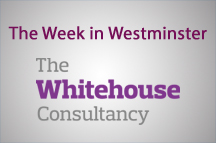 This week saw the Government outline its legislative agenda for the forthcoming parliamentary year in a Queen’s Speech that many had assumed would be light on ambition. Amongst the measures announced were a Digital Economy Bill to ensure that every home has the right to a fast broadband connection, a Modern Transport Bill to encourage investment in driverless cars, and a Neighbourhood Planning and Infrastructure Bill designed to make it easier to get planning permission for new housing developments.
This week saw the Government outline its legislative agenda for the forthcoming parliamentary year in a Queen’s Speech that many had assumed would be light on ambition. Amongst the measures announced were a Digital Economy Bill to ensure that every home has the right to a fast broadband connection, a Modern Transport Bill to encourage investment in driverless cars, and a Neighbourhood Planning and Infrastructure Bill designed to make it easier to get planning permission for new housing developments.
Although the Queen’s Speech included some populist steps, such as an NHS Overseas Visitors Charging Bill that will require migrants to pay when obtaining healthcare to which they are not entitled, it also contained some far sighted proposals aimed at social reform and changes to public service delivery. The Prison and Courts Reform Bill will put a new emphasis on training, rehabilitation and education – a big shift away from the “prison works” ethos of the Prime Minister’s political mentor. The Higher Education Bill will remove barriers for new universities to be set up, and allow existing education providers to get university status. The Government also reaffirmed its commitment to make every school an academy, but wary of alienating the teaching sector further, stepped back from the threat of compulsion.
Running throughout the Queen’s Speech was the theme of improving life chances. Plans to speed up the adoption process, and a Help to Save scheme for those on low incomes served as implicit reminders that George Osborne intends to use the first Tory majority in 23 years to reshape perceptions about the Conservatives view the most vulnerable in society.
TTIP concerns force amendment to Queen’s Speech
 The Queen’s Speech was broadly well received, with The Independent praising the prison reforms as long overdue. However, it received a muted response from some Conservative MPs owing to an apparent volte-face over the proposed Sovereignty Bill. Former Work & Pensions Secretary Iain Duncan Smith accused the Prime Minister of ditching manifesto pledges to curry favour with those in favour of remaining in the European Union.
The Queen’s Speech was broadly well received, with The Independent praising the prison reforms as long overdue. However, it received a muted response from some Conservative MPs owing to an apparent volte-face over the proposed Sovereignty Bill. Former Work & Pensions Secretary Iain Duncan Smith accused the Prime Minister of ditching manifesto pledges to curry favour with those in favour of remaining in the European Union.
Discontent simmered further on Thursday when the Prime Minister became the first premier in history to be forced to accept an amendment to the Queen’s Speech, after Tory rebels sided with Labour to demand guarantees that the NHS would be exempt from the Transatlantic Trade and Investment Partnership.
Given that the alliance included Conservative MPs such as Liam Fox who are known for their free market and Atlanticist views, the forced compromise was seen more as a salvo in the EU referendum battle rather than a serious expression of concern about the minutiae of TTIP.
Remain pulls ahead in EU referendum campaign
The EU referendum campaign descended further into acrimony following Boris Johnson’s invocation of Hitler as the original advocate of modern European integration. Lord Heseltine, Boris’s predecessor as MP for Henley, denounced his comments as “obscene” and “preposterous”, leading Jacob Rees-Mogg to brand the former Deputy Prime Minister a “frightful old humbug.”
While The Daily Telegraph suggested that the Prime Minister would seek to heal the rift in the Conservative Party with a post-referendum ‘unity’ reshuffle, The Times instead indicated that Cabinet Brexiteers such as John Whittingdale and Theresa Villiers could face the axe. All this led to a plea from Wycombe MP Steve Baker for an end to “personal nastiness” and a warning that disagreement over the EU was in danger of turning into deep division.
Meanwhile, an ORB survey suggested that Remain had started to pull ahead in the opinion polls, with 55% of voters indicating that they wished to remain in the EU, a 4% increase on the previous month. A MORI poll predicted an even bigger lead for Remain of 18%, but this was couched with a warning that turnout would be key. A survey by the NUS suggested that more than half of students – a demographic widely seen as being strongly in favour of EU membership – were not even aware of the referendum date.














